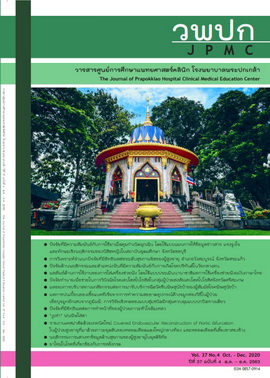Factors Influencing Functional Status among Heart Failure Patients
Main Article Content
Abstract
Background: Heart failure is a major health problem in Thailand. When severity increases, the functional status and activities may be reduced resulting in rehospitalization. Thus, factors affecting the functional status among heart failure patients would promote their functional status and quality of life.
Objectives: This research aimed to explore the functional status and factors influencing the functional status including fatigue, dyspnea, depression and nutrition status among heart failure patients.
Materials and methods: This was a descriptive predictive research. The sample consisted of 85 patients who had been diagnosed with heart failure that had received treatment at a cardio clinic in the Outpatient Department. The patients were randomly selected by a systematic random sampling technique between February to May 2018. The research instruments utilized for the collection of the data consisted of a demographic questionnaire, functional status questionnaire, fatigue, dyspnea and depression assessment status, and BNT nutrition status assessment form. Descriptive statistics and stepwise multiple regression were used to analyze the collected data.
Results: The results revealed that the heart failure patients had a moderately high level of functional status (M =3.2; SD=0.7), moderate fatigue (M = 4.5; SD = 1.8), mild dyspnea (M = 2.2; SD = 0.5), no depression (74.1%), and no malnutrition (62.3%). The factors influencing the functional status among heart failure patients were fatigue (Beta = -0.27), nutrition status (Beta = -0.25), dyspnea (Beta = -0.26), and depression (Beta= -0.19), which were likely to significantly predict the variance in the functional status (R2 = 0.48, p < 0.001)
Conclusion: This study found that the factors could predict the functional status among heart failure patients that included fatigue, nutrition status, dyspnea and depression. The results from this study could be used to develop an intervention that would aim to promote the functional status among heart failure patients’ management by focusing on fatigue, dyspnea, depression, and nutrition status.
Article Details
References
Yancy CW, Jessup M, Bozkurt B, Butler J, Casey DE Jr, Colvin MM, et al. 2017 ACC/AHA/HFSA Focused update of the 2013 ACCF/AHA guideline for the management of heart failure: a report of the American college of cardiology/American heart association task force on clinical practice guidelines and the heart failure society of America. J Am Coll Cardiol 2017;70:776-803.
Mozaffarian D, Benjamin EJ, Go AS, Arnett DK, Blaha MJ, Cushman M, et al. Executive summary: heartd disease and stroke statistics--2016 update: a report from the American heart association. Circulation 2016; 133:447-54.
Apiromrat R. Promotion of quality of life among patients with congestive heart failure. Thai Journal of Cardio-Thoracic Nursing 2017;28(2):2-15.
Wu JR, Lennie TA, Frazier SK, Moser DK. Health-related quality of life, functional Status, and Cardiac Event-Free Survival in Patients With Heart Failure. J Cardiovasc Nurs 2016;31:236-44.
Leidy NK. Functional status and the forward progress of merry-go-rounds: toward a coherent analytical framework. Nurs Res 1994;43:196-202.
Hachuk W, Wattanakitkrileat D. The influence of uncertainty in illness, health literacy, and social support on quality of life of patients with heart failure. Journal of Nursing Science Chulalongkorn University 2013;25(1):79-92.
Tajit P, Vannarit T, Chaiard J. Dyspnea, fatigue and functional performance among persons with heart failure. Nursing Journal 2018;45(2):28-39.
Damnong N, Deenan A, Kunsongkeit W. Factors related to functional performance of rehospitalized patients with heart failure. Journal of Boromarajonani College of Nursing, Bangkok 2015;31(3) :74-83.
Tevik K, Thürmer H, Husby MI, de Soysa AK, Helvik AS. Nutritional risk screening in hospitalized patients with heart failure. Clin Nutr 2015;34:257-64.
Agra Bermejo RM, Ferreiro RG, Román AV, Otero IG, Kreidieh O, Sabarís PC, et al. Nutritional status is related to heart failure severity and hospital readmissions in acute heart failure. Int J Cardiol 2017;230:108-14.
Dodd M, Janson S, Facione N, Faucett J, Froelicher ES, Humphreys J, et al. Advancing the science of symptom management. J Adv Nurs 2001;33:668-76.
Faul F, Erdfelder E, Buchner A, Lang AG. Statistical power analyses using G*Power 3.1:tests for correlation and regression analyses. Behav Res Methods 2009 ;41:1149-60.
Witheethamasak P. Relationship between symptom cluster and functional performance among patients with chronic obstructive pulmonary disease patients[dissertation]. Chonburi: Faculty of nursing, Burapha University. 2010.
Kronkasem A, Wattanakitkrileart D, Pongthavornkamol K, Kanoksin A. Fatigue experience, symptom management strategies and functional status in patients with congestive heart failure. [dissertation]. Bangkok: Faculty of Nursing, Mahidol University; 2014.
Jampat L. Nutritional status and health status of patients with chronic obstructive pulmonary disease [dissertation]. Nakhonsithammarat: Faculty of nursing, Walailak University; 2008.
Srikong P, Selected factors related to dietary control self-management among heart failure patients, lower northeast region. [dissertation]. Bangkok: Faculty of Nursing, Chulalongkorn University; 2010.
Nutrition Unit Bhumibol Adulyadej Hospital. Bhumibol Adulyadej Hospital Nutrition Triage (BNT) [Internet]. 2013. [cited 2017 Jan 8]. Available from: http://admin.bhumibolhospital.rtaf.mi.th/index.asp?pageid=884&parent=612&directory=4247&pagename=viewbranch1

